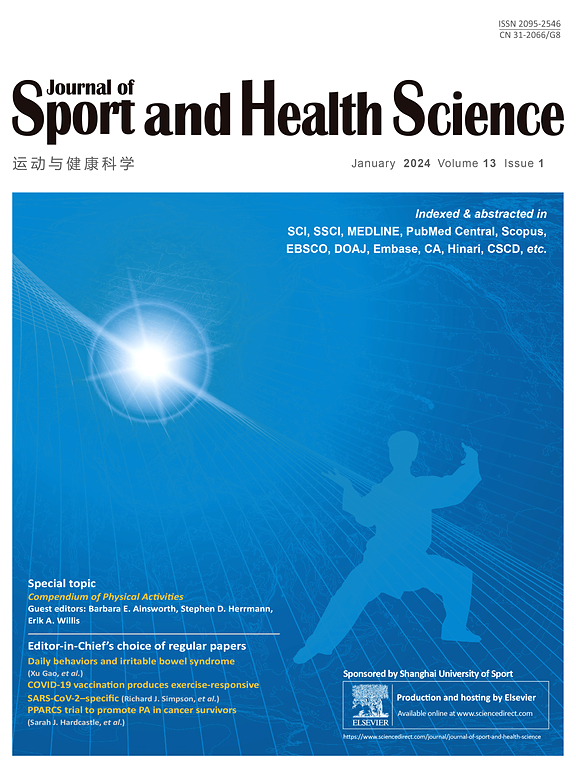体育活动干预对幼儿基本运动技能和认知功能的影响:系统回顾和网络荟萃分析。
IF 10.3
1区 医学
Q1 HOSPITALITY, LEISURE, SPORT & TOURISM
引用次数: 0
摘要
背景:许多体育活动(PA)干预对改善儿童基本运动技能(FMS)和认知功能(CF)的健康益处已被报道,但对提高儿童早期FMS和CF最有效的PA干预类型仍不清楚。因此,本研究旨在确定PA干预对提高幼儿FMS和CF的作用,并确定PA干预的最佳类型。方法检索6个电子数据库(PubMed, Ovid, SPORTDiscus, Scopus, Web of Science, Cochrane Central Register of Controlled Trials),检索从研究开始到2024年3月17日的研究。如果随机对照试验(RCTs)报告的结果与FMS、CF或两者均与PA干预相关,则纳入本研究。效应量被计算和执行为对冲系数g。竞争干预的层次是使用累积排名曲线(SUCRA)下的表面来建立的。使用Cochrane Risk-of- bias 2独立评估偏倚风险。该分析包括38项研究,5237名幼儿,样本量从32到897名参与者。分析的PA干预类型包括主动游戏/自由游戏/非结构化PA (AP)、一般结构化PA (GSPA)、以基本运动技能为目标的PA计划(fms -program)、认知参与PA计划(CPA)、多层次PA干预(MPA)和练习。PA干预对总FMS有较大的综合效应量(g = 0.96;95%CI: 0.45 - 1.46; p< 0.01; I² = 94%)。对于CF,发现了小到中等的合并效应大小(g = 0.39;95% CI: 0.18 - 0.60; p < 0.01; I² = 88%)。超过3个月的PA干预对FMS的益处较少(P < 0.01)。网络荟萃分析表明,FMS项目(标准平均差(SMD) = 1.55,95%置信区间ci: 0.98 - 2.11, SUCRA = 98.3%)和GSPA (SMD = 0.94,95%置信区间ci: 0.05 - 1.85, SUCRA = 69.8%)显著提高总比美联社FMS。运动技能(LMS) exergaming排名最高(SUCRA = 79.3%),其次是FMS项目(75.9%)和GSPA(61.6%)。然而,尽管exergaming排名第一,但其效应估计并不具有统计学意义(SMD = 1.38,95%CI: -0.08 ~ 2.85)。对于物体控制技能(OCS),练习游戏再次排名最高(SUCRA = 91.9%),并显示出最大的显著影响(SMD = 2.38,95%CI: 0.96 - 3.80),其次是fms程序(78.5%)和GSPA(53.7%)。与AP相比,fms -program、GSPA、MPA和UC也显著改善了OCS。尽管在PA干预中,大多数CF域没有显著差异,但exergaming对工作记忆有显著的积极影响(SMD = 1.41,95%CI: 0.07 - 2.75)。证据的确定性从低到中等不等。结论:这些发现强调了PA干预对改善儿童早期FMS和CF的重要性。FMS计划和GSPA似乎是提高总FMS的最有效方法,而练习对LMS和OCS排名最高,对OCS有显著影响,但对LMS的改善不确定。此外,游戏对工作记忆有积极影响,这表明它对认知有潜在的好处。本文章由计算机程序翻译,如有差异,请以英文原文为准。
Effects of physical activity interventions on fundamental movement skills and cognitive function in early childhood: A systematic review and network meta-analysis.
BACKGROUND
Health benefits have been reported for many physical activity (PA) interventions for improving fundamental movement skills (FMS) and cognitive function (CF), but the most effective type of PA interventions for enhancing FMS and CF in early childhood remain unknown. Thus, the study aims to determine the effects of PA interventions in enhancing FMS and CF among young children and to establish the optimal types of PA interventions.
METHODS
Six electronic databases (PubMed, Ovid, SPORTDiscus, Scopus, Web of Science, Cochrane Central Register of Controlled Trials) were searched for studies from inception to March 17, 2024. Randomized controlled trials (RCTs) were included in this study if they reported outcomes related to FMS, CF, or both associated with PA interventions. Effect sizes were calculated and performed as Hedges g. The hierarchy of competing interventions was established using the surface under the cumulative ranking curve (SUCRA). Risk of bias was independently assessed using the Cochrane Risk-of-Bias 2.
RESULTS
This analysis included 38 studies with 5237 young children, with sample sizes ranging from 32 to 897 participants. The types of PA interventions analyzed included active play/free play/unstructured PA (AP), general structured PA (GSPA), fundamental movement skills-targeted PA programs (FMS-programs), cognitively-engaging PA programs (CPA), multilevel PA interventions (MPA), and exergaming. PA interventions had a large, pooled effect size for total FMS (g = 0.96; 95%CI: 0.45 - 1.46; p< 0.01; I² = 94%). For CF, a small-to-moderate pooled effect size was found (g = 0.39; 95% CI: 0.18 - 0.60; p < 0.01; I² = 88%). PA interventions longer than 3 months showed fewer benefits for FMS (P < 0.01). The network meta-analysis showed that FMS-programs (standardized mean difference (SMD) = 1.55, 95%CI: 0.98 - 2.11, SUCRA = 98.3%) and GSPA (SMD = 0.94, 95%CI: 0.05 - 1.85, SUCRA = 69.8%) significantly improved total FMS compared to AP. For locomotor skills (LMS), exergaming ranked highest (SUCRA = 79.3%), followed by FMS-programs (75.9%) and GSPA (61.6%). However, despite its top ranking, exergaming's effect estimate was not statistically significant (SMD = 1.38, 95%CI: -0.08 to 2.85). For object control skills (OCS), exergaming again ranked highest (SUCRA = 91.9%) and showed the largest significant effect (SMD = 2.38, 95%CI: 0.96 - 3.80), followed by FMS-programs (78.5%) and GSPA (53.7%). FMS-programs, GSPA, MPA, and UC also significantly improved OCS compared to AP. While no significant differences were observed across PA interventions for most CF domains, exergaming had a significant positive effect on working memory (SMD = 1.41, 95%CI: 0.07 - 2.75). The certainty of evidence varied from low to moderate.
CONCLUSION
These findings emphasize the importance of PA interventions in improving FMS and CF in early childhood. FMS-programs and GSPA appear to be the most effective approaches for enhancing total FMS, while exergaming showed the highest ranking for LMS and OCS, with a significant impact on OCS but uncertainty in LMS improvements. Additionally, exergaming had a positive effect on working memory, suggesting its potential cognitive benefits.
求助全文
通过发布文献求助,成功后即可免费获取论文全文。
去求助
来源期刊

Journal of Sport and Health Science
SPORT SCIENCES-
CiteScore
18.30
自引率
1.70%
发文量
101
审稿时长
22 weeks
期刊介绍:
The Journal of Sport and Health Science (JSHS) is an international, multidisciplinary journal that aims to advance the fields of sport, exercise, physical activity, and health sciences. Published by Elsevier B.V. on behalf of Shanghai University of Sport, JSHS is dedicated to promoting original and impactful research, as well as topical reviews, editorials, opinions, and commentary papers.
With a focus on physical and mental health, injury and disease prevention, traditional Chinese exercise, and human performance, JSHS offers a platform for scholars and researchers to share their findings and contribute to the advancement of these fields. Our journal is peer-reviewed, ensuring that all published works meet the highest academic standards.
Supported by a carefully selected international editorial board, JSHS upholds impeccable integrity and provides an efficient publication platform. We invite submissions from scholars and researchers worldwide, and we are committed to disseminating insightful and influential research in the field of sport and health science.
 求助内容:
求助内容: 应助结果提醒方式:
应助结果提醒方式:


